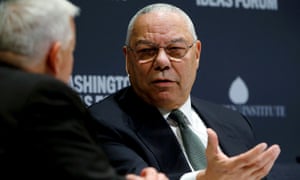Party members and former allies are increasingly willing to criticize the president. But grassroots support remains strong

Photograph: Mitt Romney/Reuters
Now they were truly on different sides of the fence. Donald Trump, the 2016 Republican nominee for president, spent Sunday tweeting from inside the White House. Outside the fortified cage, Mitt Romney, the 2012 Republican nominee, wore a face mask and joined marchers supporting Black Lives Matter.
It was a symbolic standoff between the new Republican party and the old. And it came on the same day that Colin Powell, former secretary of state under George W Bush, announced that he would be voting for Democrat Joe Biden in November. Trump, Powell told CNN, “lies about things”.
There is no guarantee voices of dissent from party leaders will translate to the Republican grassroots, where Trump retains overwhelming support. But some critics of the president believe his responses to both the coronavirus pandemic and nationwide protests triggered by the police killing of George Floyd leave him uniquely exposed.
Whatever their public pledges of fealty, many Republican senators privately agree with Romney and Powell, according to Rick Wilson, creative director of the Lincoln Project, a political action committee formed by Republicans opposed to Trump’s reelection.
“We have elected members of Congress, elected governors, statewide elected officials, House members – not as many House members any more because the House is pretty ‘Trumpy’ now – but I have people in the White House who, the minute the day is over, call me on their burner phones and just data-dump every day because the madness is that deep and that crazy inside and it’s going to get worse. And Trump knows it’s going to get worse.”
Since winning the White House, Trump has exercised a vice-like grip on the Republican party. Many former political foes, such as Senators Ted Cruz and Lindsey Graham, have become ardent backers. Graham told Fox News last week: “To lay the blame at President Trump’s feet for the division in this nation is a pretty short-sighted view of it.”
But a growing chorus of Republicans and military leaders have condemned Trump’s aggressive response to the protests, which included a threat to deploy American soldiers on the streets and showed little intellectual or emotional grasp of centuries of racial injustice.
Last week, Trump’s former defence secretary, the retired general Jim Mattis, spoke out against what he called Trump’s “deliberate” efforts to divide the country. His long-awaited intervention was welcomed by Romney, now a senator for Utah, and the retired four-star general John Kelly, Trump’s former chief of staff.

The former Joint Chiefs of Staff chairmen Michael Mullen and Martin Dempsey have also eviscerated Trump’s handling of the unrest. And last week the Republican senator Lisa Murkowski admitted she was “struggling” with whether to support Trump’s re-election.
Several Republican groups have formed to oppose his 2020 bid, including Republican Voters Against Trump, which last week launched a $10m digital ad campaign, and the Lincoln Project, which has produced a series of hard-hitting advertisements that got under the president’s skin.
Wilson, who is also one of its co-founders, said: “For a long time individuals in the party were very suppressed by the fear of Donald Trump destroying them because he would tweet about them, he would say bad things about them and it could wreck somebody’s primary chances or hurt them in some other political space.
“Now we’ve reached a point where the intolerance for his incompetence has reached just stratospheric levels. People just cannot abide it. It’s one thing to say, ‘Oh, he’s rough around the edges but he gets things done,’ but now he’s failing in so many dimensions that people are no longer tolerant of it.”
Some Republicans fear that Trump’s unpopularity, which led to defeat in the House of Representatives in 2018, could cost them their Senate seats in November. Wilson added: “His political standing has collapsed so greatly that it’s easier for these folks to not feel the same risk level. There’s going to come a point very soon where having a nasty tweet from the president is a badge of honour and a tool of survival because my rule of ‘everything Trump touches dies’ is real.
“The people that are trying to get away from it now, I think, are going to end up in a better position than they would have been prior to this. There are many more people that are going to put daylight between themselves and this president because he is political herpes. They don’t want to be touched by it.”
There are reasons to be cautious, however. Trump has the backing of more Republican elected officials than he did in 2016, with many having learned to bite their lips and be grateful for his tax cuts, conservative judges and other policies.
Those now criticising the president did not vote for him in 2016 either, and Romney pinned his colours to the mast when he was the sole Republican to vote for Trump’s removal from office after the impeachment trial. Moreover, attacks from party elders have sometimes been counterproductive, reinforcing Trump’s image as a Washington outsider who will shake up the status quo.
The president’s base remains solid, and his “law and order” response to the protests is likely to harden it even further. In a recent NBC News/ Wall Street Journal poll, Biden stands at 49% and Trump at 42%, though among self-identified Republicans, the margin is 92% to 4% in favour of the president.
A CNN analysis noted that, since 2000, no Republican ever had more than 91% of Republicans supporting him at this point in ABC News/ Washington Post polling. But Trump is faring worse at this point with independents and Democrats than any Republican over the same period. The base alone may not be enough to secure a second electoral college win.
Despite a global pandemic, economic slump and mass protests, Trump, who in April tweeted that Mutiny on the Bounty was one of his favourite films, has been quick to crush any signs of rebellion. Murkowski, Powell and Romney were all met with disparaging tweets, a clear warning to anyone else who might be tempted.
Monika McDermott, a political science professor at Fordham University, said: “In terms of officeholders, I think what’s always held them back is fear of the retribution because he’s shown with [retired senator] Jeff Flake and others that he will wreak havoc or vengeance on those who don’t toe his line. I think that you might have more people speaking out against him if they weren’t afraid of the consequences of it.”
Some Republicans, however, feel liberated to call out the president at this historic moment of reckoning. Ed Rogers, a political consultant, said: “I think he has broad support but there’s less suppression of candour than there has been and you see that manifested with the likes of Murkowski, Mattis, whoever it is. Defending the indefensible and denying the obvious is untenable in the long term in the political realm.”
Rogers served in the Ronald Reagan and George HW Bush administrations. Will he vote for Trump? “Probably.”




